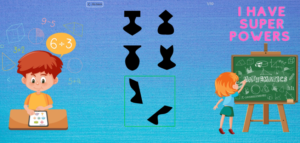
Educational entrepreneur Mike Quinn, based in North Liberty, Iowa, has launched a new and innovative way of learning math and spatial learning.
Mr. Quinn developed Learn Spatial, a website and app that will launch later this fall, to raise the confidence of children struggling in math classes and cognitive learning skills.
Learn Spatial trains kids for the Student Success Scholarship, better known as STEM success, by focusing on spatial learning.
“Spatial ability is the ability to understand how objects relate to each other in space and being able to visualize an image in your mind and manipulate it in order to make decisions,” he said. “It can be making decisions about walking in a busy hallway or figuring out a math equation.”
The Learn Spatial program provides a daily game sequence that can be for two or six weeks. Mr. Quinn beta tested the games with 200 students in 2022. He said the program is backed by several research studies.
“This kind of training does affect kids and helps them in school and in the real world,” he said. “The idea is really to take spatial learning to a digital form and take it to the world. That’s why we started all this.”
Learn Spatial programming
The training program consists of mental rotation, transformation and spatial learning practice. Helping children who are lagging behind in math acquire needed skills for their ongoing educational time.
The website is packed with an account profile for users to keep track of their learning progress in the “stats” section and pick different games in the “arcade” section.
The games are meant to be played directly before learning math or completing homework to improve spatial skills. Mr. Quinn said adults can also use the software to improve their spatial understanding and memory, since many adults have math-based anxieties.
“A lot of people struggle with these specific, spatial abilities,” he said. “It could be math for them or merging on a highway when you drive. There’s more to it than just math and it can really help people.”

Why spatial learning
Mr. Quinn has a personal passion for learning and education. He originally created Learn Spatial to help his children learn math and science more efficiently.
“I started this to help my kids, knowing that they think a little bit differently than other kids,” he said. “We live in a neurodivergent family and one of my children was struggling and we did cognitive testing. She showed a low visual, spatial ability and working memory and I dug in from there.”
Mr. Quinn said the testing led him to dive deeper into the research on spatial learning and children’s memory. He then discovered the importance of these skills were present in a variety of tasks his children would need in the long term.
During his research, Mr. Quinn was part of the Builders + Backers program where mentors encouraged him to pursue the website and app, eventually helping to fund the program.
Mr. Quinn said he is excited to launch the program and help students across the country learn these needed skills. Looking forward, he said he hopes to build a stronger website one day with a more powerful suite of learning tools.
“The goals are really to impact kids’ lives, to make a difference, and give kids opportunities to make a difference in their learning,” he said. “I’m hopeful that we can bridge those gaps by giving kids the tools they need to be successful … There are a ton of other areas that I want to address, other cognitive skills, that can help kids.”
By Caitlin Tylka and Eleanor Hildebrandt




